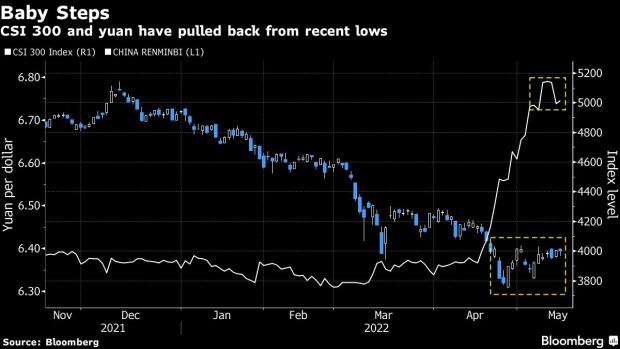May 18, 2022
China Markets Signal Pessimism Is Peaking After Brutal Selloff
, Bloomberg News

(Bloomberg) -- China’s economic activity is collapsing, there’s no end in sight to Covid Zero and the country remains isolated from the world. Yet for investors, the outlook for Chinese assets seems to be turning brighter.
While outright bulls may be hard to find, shifts in positioning at least point to improving sentiment. Bearish bets on stocks are being abandoned in Hong Kong, expectations for yuan volatility are falling, domestic equity traders have stopped unwinding leverage and foreigners have slowed their once-record exit from government bonds.
Amid a tentative stabilization in China’s stocks and currency, the moves suggest negative sentiment may be coming to a head in a market that has filleted dip buyers for more than a year. The CSI 300 Index is down 31% since nearing a record in 2021, and the yuan has slumped about 6% this year alone.
“We are approaching peak China pessimism,” Jenny Zeng, co-head of Asia Pacific fixed income at AllianceBernstein told Bloomberg TV on Wednesday.
A sustained turnaround in Chinese markets would come at an opportune time for global investors looking for a refuge from the impact of tighter monetary policy worldwide and lowered growth expectations. China is one of the few major economies where the central bank is in easing mode, inflation is not a problem, liquidity is plentiful and valuations are dirt cheap.
The hunt for good news has been a little easier this week.
Shanghai has begun to unravel a lockdown that confined millions of residents to their homes, the central bank lowered the mortgage rate for first-time homebuyers and JD.com Inc. smashed revenue expectations last quarter in a rare positive for Big Tech. China’s importers have resumed shopping for a fuel they’ll only get to use if economic activity picks up.
That has helped hollow out demand for downside insurance across Chinese markets. Options traders own the least amount of Hang Seng Index puts versus calls in almost two decades. Credit-default swaps insuring China’s five-year sovereign debt against default have fallen for four straight days, the longest stretch this year.
There are even signs of bets on capital gains -- the top eight most-owned Hang Seng contracts are all bullish, including one that profits if the index rises more than 30% by the end of June.
Still, sentiment remains fragile and dip-buyers have been burnt before. The government’s adherence to policies like Covid Zero that harm the economy has undermined investor confidence in China, already damaged by unpredictable regulation and a close relationship with Moscow.
Covid outbreaks in key cities including Beijing raise the possibility of more disruptive curbs that were already responsible for retail sales plunging in April. The property-market slowdown is showing no signs of ending, with data Wednesday showing prices dropping for an eighth consecutive month.
Policy credibility is also a concern, with government pledges of support vague and repetitive, and often lacking real follow through. Vice Premier Liu He, China’s top economic official, this week voiced support for the tech sector but offered little clarity over what that could look like.
“The fear has come down in the past few days -- this is very early stages I think,” said Mohammed Apabhai, head of Asia-Pacific trading strategy at Citigroup Inc. “The problem is investors view the Zero Covid policy as hurting China’s economy, and there’s a broader reticence to invest in China.”
©2022 Bloomberg L.P.






